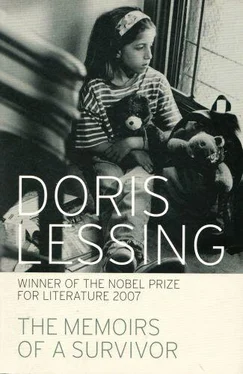In a room that had windows open to a formal garden, a room that had a 'feel' to it of another country somewhere, different from the rooms in this house, was a small bed in which the girl lay. She was older, and she was sick and fretful. Paler, thinner than at any time I had seen her, her dark hair was damp and sticky, and there was the smell of stale sweat. All around her lay books, toys, comics. She was moving restlessly and continuously, rubbing her limbs together, tossing about, turning over, crooning to herself, muttering complaints and commands to someone. She was an earthquake of fevers, energies, desires, angers, need. In came the tall large woman, preoccupied with a glass she was carrying. At the sight of the glass the girl brightened: here at least was a diversion, and she half sat up. But already her mother had set down the glass and was turning away to another duty.
'Stay with me,' pleaded the girl.
'I can't, I have to see to Baby.'
'Why do you always call him Baby?'
'I don't know, really, of course it is time… he's quite old enough to… but I keep forgetting.'
'Please, please.'
'Oh very well, for a minute.'
The woman sat on the extreme edge of the bed, looked harried, looked as she always did, burdened and irritated. But she was also pleased.
'Drink your lemonade.'
'I don't want to. Mummy, cuddle me, cuddle me…'
'Oh, Emily!'
With a flattered laugh, the woman bent forward, offering herself. The little girl put her arms up around the woman's neck, and hung there. But she got no encouragement. 'Cuddle me, cuddle me,' she was crooning, as if to herself, and it might just as well have been to herself, since the woman was so puzzled by it all. She suffered the small hot arms for a little, but then she could not help herself — her dislike of flesh raised her own hands, to put the child's arms away from her. 'There, that's enough,' she said. But she stayed, a little. Duty made her stay. Duty to what? Sickness, very likely. 'A sick child needs its mother.' Something of that sort. Between the little girl's hot needful yearning body, which wanted to be quieted with a caress, with warmth, wanted to lie near a large strong wall of a body, a safe body which would not tickle and torment and squeeze; wanted safely and assurance — between her and the mother's regularly breathing, calm body, all self-sufficiency and duty, was a blankness, an unawareness; there was no contact, no mutual comfort.
The little girl lay back and then reached for the glass and drank eagerly. The moment the glass was empty the mother got up and said: 'I'll make you another one.'
'Oh stay with me, stay with me.'
'I can't Emily. You are being difficult again.'
'Can Daddy come?'
'But he's busy.'
'Can't he read to me?'
'You can read to yourself now, you're a big girl.'
The woman went out with the empty glass. The girl took a half-eaten biscuit from under the pillow and picked up a book and read and ate, ate and read, her limbs always on the move, tossing and rearranging themselves, her unoccupied hand touching her cheek, her hair, her shoulders, feeling her flesh everywhere, lower and lower down, near to her cunt, her 'private parts' — but from there the hand was quickly withdrawn, as if that area had barbed wire around it. Then she stroked her thighs, crossed and uncrossed them, moved and twisted and read and ate and ate and read.
There lay Emily now on my living-room floor.
'Dear Hugo… dear, dear Hugo — you are my Hugo, you are my love, Hugo…'
And I was filled with that ridiculous impatience, the helplessness, of the adult who watches a young thing growing. There she was enclosed in her age, but in a continuum with those scenes behind the wall, a hinterland which had formed her — yet she could not see them or know about them, and it would be of no use my telling her: if I did she would hear words, no more. From that shadowy region behind her came the dictate: You are this, and this and this — this is what you have to be, and not that; and the biological demands of her age took a precise and predictable and clocklike stake on her life, making her exactly like this and that. And so it would go on, it had to go on, and I must watch; and in due time she would fill like a container with substances and experiences; she would be delivered by these midwives, some recognisable, understood, and common to everyone, some to be deduced only from their methods of operation — she would become mature, that ideal condition envisaged as the justification of all previous experience, an apex of achievement, inevitable and peculiar to her. This apex is how we see things, it is a biological summit we see: growth, the achievement on the top of the curve of her existence as an animal, then a falling away towards death. Nonsense of course, absurd; but it was hard to subdue in myself this view of her, shut off impatience as I watched her rolling and snuggling be side her purring yellow beast, to make myself acknowledge that this stage of her life was every bit as valid as the one ahead of her — perhaps to be summed up or encapsulated in the image of a capable but serene smile — and that what I was really waiting for (just as, somewhere inside herself she must be) was the moment she would step off this merry-go-round, this escalator carrying her from the dark into the dark. Step off in entirely… And then?
There was a new development in the life on the pavement. It was bound up with Gerald; with, precisely, his need to protect the weak, his identification with them, that quality which could not be included in the little balance sheets of survival. There were suddenly children out there, nine, ten, eleven years old, not attached to families, but by themselves. Some had parents they had run away from, or whom they did see, but only occasionally. Some had no parents at all. What had happened to them? It was hard to say. Officially of course children still had parents and homes and that kind of thing, and if not, they had to be in care or custody; officially children even went to school regularly. But nothing like this was the practice. Sometimes children attached themselves to other families, their own parents being unable to cope with the pressures, not knowing where to find food and supplies, or simply losing interest and throwing them out to fend for themselves as people had once done with dogs and cats that no longer gave pleasure. Some parents were dead, because of violence, or epidemics. Others had gone away out of the city and left their children behind. These waifs tended to be ignored by the authorities unless attention was specifically drawn to them, but people might feed them or take them into their own homes. They were still part of society, wished to be part, and hung around where people lived. They were quite unlike those children whom I will have to describe quite soon, who had put themselves outside society altogether, were our enemies.
Gerald noticed that a dozen or so children were literally living on the pavement, and began to look after them in an organised way. Emily of course adored him for this, and defended him against the inevitable criticism. It was mostly of old people that it was said they should be allowed to die — I can tell you that this added a new dimension of terror to the lives of the elderly, already tenuous — that the weaker had to go to the wall: this was already happening, and was not a process that should be checked by sickly sentiment. But Gerald took his stand. He began by defending them when people tried to chase them away. They were sleeping on the waste lot behind the pavement, and complaints started about the smell and the litter. Soon would happen what we all feared more than anything at all: the authorities would have to intervene.
Читать дальше
Конец ознакомительного отрывка
Купить книгу












